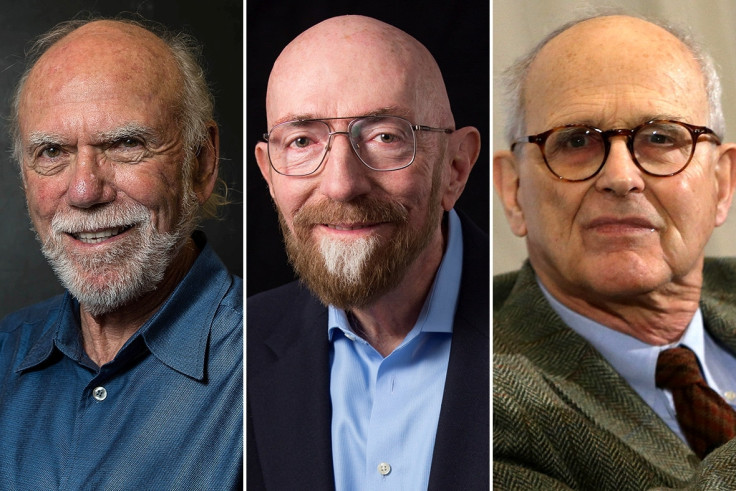2017 Nobel Prize in Physics awarded to gravitational wave scientists
Gravitational waves were detected for the first time in 2015, proving Albert Einstein correct 100 years after he predicted their existence.

The Nobel Prize in Physics for 2017 has been awarded to three American physicists who played an integral role in the observation of gravitational waves, arguably one of the most important scientific discoveries in recent times.
Rainer Weiss, Kip S. Thorne and Barry C. Barish were members of the LIGO project (Laser Interferometer Gravitational-Wave Observatory) which on 14 September 2015 detected gravitational waves for the first time in history, proving Albert Einstein correct 100 years after he predicted their existence in his famous theory of general relativity.
The Royal Swedish Academy of Sciences announced the winners today in Stockholm. Half of the 9m Swedish Kroner (£825,000) prize will go to Weiss, while the other half will be split equally between Thorne and Barish.
"The first ever observation of a gravitational wave was a milestone - a window on the Universe," said Olga Botner, from the Academy, speaking at the Conference.
In his 1915 theory, Einstein outlined how ripples are created in the very fabric of spacetime itself when objects with large masses collide. These ripples are known as gravitational waves.
Even though the cataclysmic events which cause gravitational waves are incredibly powerful, the signals are almost imperceptible by the time they reach earth, requiring extremely sensitive instruments to detect them. The technology needed to do this has taken decades to develop and is so advanced that even Einstein himself was convinced that it would never be possible.
To make the observation, the US-based LIGO detector used a pair of giant laser devices to measure ripples thousands of times smaller than an atomic nucleus as the gravitational waves passed Earth. The signals detected in 2015 originated from the collision of two black holes and took 1.3 billion years to reach Earth.
The LIGO project has involved thousands of researchers from more than twenty countries, but the Nobel panel deemed that the three physicists had made an outstanding contribution towards the first observation of the waves.
Weiss, a professor of physics at the Massachusetts Institute of Technology, made a key contribution to the development and construction of LIGO. In the 1970s he analysed possible sources of background noise which could interfere with any future gravitational wave observation technology. He also designed a detector which could overcome this obstacle.
Thorne, a professor of theoretical physics at the California Institute of Technology (CIT) produced important work outlining how gravitational wave signals could be identified amidst a sea of other data.
Meanwhile, Barish, a particle physicist also from CIT and the second director of LIGO, was instrumental in seeing the project through to construction, despite the fact that when he took over in 1994, it was in danger of being scrapped.
All three are now part of an exclusive club containing 204 previous winners of the Physics Nobel Prize.
Weiss said it was "really wonderful" to receive the news this morning. Speaking over the phone at the award ceremony he said: "I view this more as a thing that recognises the work of about 1,000 people. I hate to tell you but it's as long as 40 years of people thinking about this, trying to make a detection and sometimes failing in the early days, and then slowly but surely getting the technology together to be able to do it."
"It's very very exciting that it worked out in the end, that we are actually detecting things and adding to the knowledge through gravitational waves of what goes on in the universe."
Many expected the discovery of the waves to be recognised in last year's Nobel Physics prize, however, it went instead to three British physicists for their work on strange states of matter that could lead to the development of super powerful quantum computers, among other ground-breaking technologies.
Since then unfortunately, another key player in the discovery, Scottish physicist Ron Drever, passed away. It is likely he would have shared the 2017 award for his work in developing some of the early laser detection systems.
The observation of gravitational waves promises a revolution in our understanding of the universe, especially when it comes to observing incredibly violent and catastrophic events like the collision of black holes.
Just last week, physicists announced the fourth ever detection of gravitational waves – and the first time they have been observed by two separate detectors.
Detection by two observatories on different continents is important as it allows astronomers to determine the location and distance of the original event with around ten times more accuracy. The event in question was a cataclysmic collision of two rotating black holes – 25 and 31 times more massive than the Sun – that took place around 2 billion years ago
© Copyright IBTimes 2025. All rights reserved.





















